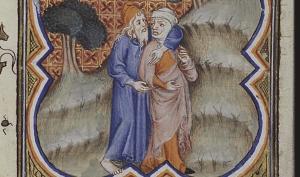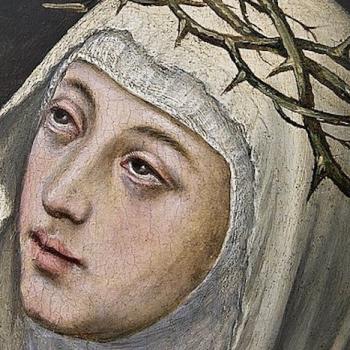
The prophets of Judah and Israel are often seen as vertical in their messaging. The hand of God, that is, reaches straight down from heaven with a burning coal and they suddenly have something to say. Despite being just a boy (Jeremiah), a man of unclean lips (Isaiah), or a shepherd and sycamore arborist from far away (Amos), God puts words in their mouths.
I don’t think this is the full story for any of the prophets. But it is often how they themselves describe their vocations.
In this regard, Hosea is the most diagonal of the prophets. The message that he offers comes not as an intervention that catches him unawares. Rather, it is an outgrowth of his own experiences, which he comes to see as angling up into God’s experience.
Hosea and his Family
The story itself is a harrowing family drama. Hosea marries a woman, Gomer, who has multiple lovers. She carries on in her adulterous affairs after their marriage. She bears children to Hosea, though their parentage is far from certain.
The risk of female infidelity, in an ancient patriarchal culture, is existential. This helps explain, though it does not explain away, the gender inequity in Israel’s adultery laws. As land and dowries pass from fathers to children, paternity questions becomes a matter of survival. A child born into a home from a separate biological line could spell the end of that household.
This crisis becomes real for Hosea when he looks in the face of one of his children and names him “Not My People.”
The Diagonal Prophet
Now there is, to be sure, a “vertical” element in all of this. Like symbolic acts of other prophets, Hosea describes his marriage to Gomer as obedience to a divine command. His marriage will be a display of God’s own experience. In making idols and aligning themselves with armies of great kings, Israel is running around on Yahweh.
This time, though, the symbolic act is not like Jeremiah walking around in mildewed underwear (Jer. 13), or Isaiah going around with none (Is. 20). It’s a family in crisis. Rabbi Abraham Joshua Heschel suggests, in fact, that Hosea’s marriage is not symbolic at all. It is instead an experience that changes him. And in changing him, it gives him insight into and empathy for the inner life of God.
This means that the way Hosea told it might not be quite the way it actually happened. Or at least the order in which it happened. Maybe instead of marrying an unfaithful woman because God told him to, Hosea simply married a woman. As she bore him children, he discovered the secrets she was keeping. And suddenly everything he believed and loved and worked for was under threat.
There, God says. That is what it is like to be me.
I taught them to walk!
Rabbi Heschel’s hypothesis is not just about mitigating the theological and ethical problem of the divine command here (“Go, get yourself a wife of whoredom,” as the NJPS puts it). He thinks the rest of the text bears out his claim.
Hosea seems, more than any other of the prophets, to identify with divine emotions. God rages like a lion at Israel’s infidelity (13:7). More poignantly still, God acts like a she-bear whose sees her cubs threatened (13:8). Are we talking about Yahweh of Israel, who is losing his covenant partner and children to bronze idols and the armies of emperors? Or about the man whose wife has secret lovers, and whose children have unknown fathers?
At one point (13:8-9) the prophet even switches pronouns from “he” to “I,” as if Hosea himself has lost track of whose story he is telling.
How can those not be my children, Hosea wonders, when I am the one who taught them to walk? Similarly,
When Israel was a child, I loved him,
and out of Egypt I called my son.
The more I called them,
the more they went from me;
they kept sacrificing to the Baals,
and offering incense to idols.
Yet it was I who taught Ephraim to walk,
I took them up in my arms. (11:1-3)
How could I possibly let the wife and the children go, these that I love so dearly, Hosea wonders? And then he gives us God’s painful soliloquy.
How can I give you up, Ephraim?
How can I hand you over, O Israel? (11:8)
The Pattern in Hosea’s Crisis
These passages show that, while the crisis here is ecomonic, it is not just economic. Not, that is, if by this we mean a cold and loveless contractual bond. Hosea feels a deep attachment to his beloved family, enters into crisis when that attachment comes unraveled, and then finds that he is performing in his own life God’s attachment to Israel. Prophecy is about pattern-recognition rather than prediction, as I’ve put it before in this column. Hosea lives his life. Then he is overwhelmed when he comes to see it as patterned on God’s.
This is what, for me, makes Heschel’s argument persuasive. After all, God does not choose the Israelites because they are unfaithful, but because he loves them. If Hosea lives the nightmare his book describes, and doesn’t just perform it for its symbolic power, then this brings him a little closer still to God’s own experience.
“Only by living through in his own life what the Consort of Israel experienced,” Heschel says, “was the prophet able to attain sympathy for the divine situation.”
Sympathy, or empathy we would now most likely say, connotes love and deep attachment. It’s what happens when our experience come close enough to the experience of another that we can feel the two resonate together. And here, Hosea’s journey resonates with God’s.
To be brought closer to God’s life and love is unequivocally a good thing. That does not make it pleasant. Hosea, the diagonal prophet, finds himself living an analogy of God’s love. And it very nearly breaks him apart.










